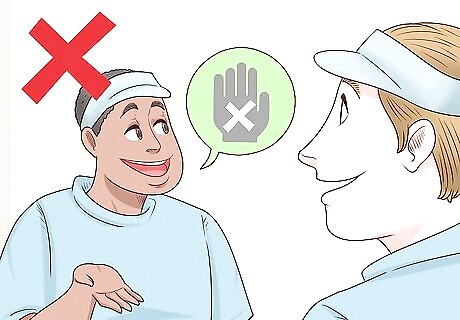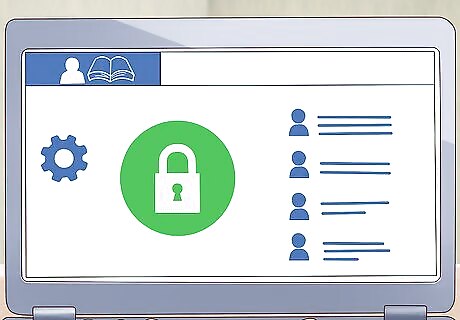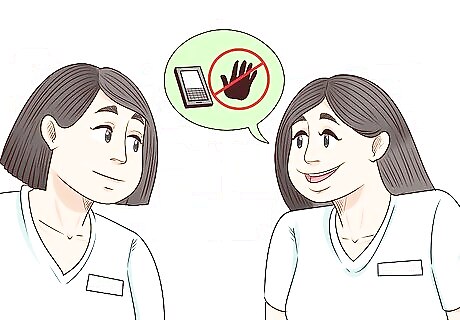
views
Answering Nosy Questions

Avoid the question by leaving the conversation if you feel uncomfortable. A workplace is an easy environment to leave a conversation because you always have the option to say you need to go do some work. If you get asked a question that you feel uncomfortable answering, inform the person that there is a task you need to go do. For example, you could say, “I’m sorry to have to leave, but there is an email that I need to go send.” If you work directly with the person and you can’t use a work task as an excuse to leave, excuse yourself to go to the bathroom.

Deflect the question by asking them the same question back. Deflection is a subtle way to avoid a topic without openly stating that you don’t want to talk about it. When you’re asked a question, say that you’re unsure and then ask them the same question back. For instance, if someone asks when you will have children, inform them that you’re not sure, and ask them the same question. Nosy people often enjoy talking about themselves and will generally leap at the opportunity to talk about their personal lives.

Use humor to avoid answering questions that you find awkward. Humor is a great way to avoid answering a question without making the situation awkward and will generally stop the person from prying further. Next time you are asked an awkward question, respond with a humorous comment. For instance, if someone asks how much you earn, you could say, “Half of what I’m worth.” If you can’t think of a clever response on the spot, laugh gently at their question as if you thought it was a joke. For example, if someone asks you how old you are, you could respond with laughter and say, “That’s a funny question.”

Respond vaguely and change the subject to keep yourself out of the spotlight. If you give boring, dull, or vague answers, people are unlikely to try to continue the conversation with you. Give them an uninteresting answer and then ask them a question about something else. For example, if someone asks why you’re single, you could respond with, “I like to keep to myself. Anyway, have you watched any good movies lately?” Giving short and vague answers will make it hard for the person to come up with further questions. For instance, if someone asks how you are, just say, “I’m good.”

Prepare responses to questions that you don’t like so you're not caught off-guard. At different stages of your life, you are often regularly asked the same questions over and over. Having responses prepared to the recurring questions will take the pressure off and prevent you from accidentally giving away more personal information than you want to. Think about the questions you often receive that make you feel uncomfortable. Write down some responses to these that you can use later. For example, if you are often asked when you’re having a baby, you could say, “We’re focusing on our relationship at the moment. We’ll have one when we are ready.” If you are asked when you are going to retire, you could reply with, “Right now I’m enjoying my job. I’ll leave when the time feels right.”

Communicate that you are uncomfortable with the question if necessary. Often the most direct approach is the most effective one. When someone asks you an uncomfortable question, look them in the eyes and say “I’d prefer not to talk about that.” If they continue to question you, repeat your answer and then walk away from the conversation. Try to use a polite tone to minimize any offense that might be taken from your blunt response.

Avoid telling lies to answer questions. Telling lies will generally lead to unnecessary stress and drama. Telling one lie will often require you to tell multiple more. Instead, respond with a short but honest answer or simply don’t answer the question.
Creating Boundaries with Nosy People

Send non-verbal hints that you are busy if you don't want to chat. A great way to avoid nosy questions is to look busy so that people don’t approach you. Avoid making eye contact with people that you don’t want to talk to. Put headphones in so that people think that you can’t hear them. If you are already in a conversation, stand up to indicate that you need to leave. If you are already standing, turn your body towards the door to show that you plan to exit the conversation. If you sense that someone is about to ask you a question, get your phone out and check your emails. This will give them the message that you are busy. Some people don’t take subtle hints well. In these cases you will need to be direct with the person and inform them that you are busy or don’t want to chat right now.

Block, or limit their access, to your social media profiles. Social media often has a lot of your personal information on it. This can make co-workers curious and invite personal questions. Consider blocking nosy coworkers on social media or using filtered settings to limit what information they can see about you. Keep your social media accounts private so that nosy coworkers can’t snoop without you knowing.

Assess if the person is trying to be friendly if you often find people nosy. Sometimes, people ask personal questions in order to deepen a relationship. Try to assume the best and see the persons questions as an indication that they want to pursue a friendship with you. Think about whether you want to become better friends with the person. If you would like a friendly relationship with them, start by sharing small details about yourself. If you don’t want to pursue a friendship with someone, be polite, but deflect personal conversations. If the person is known as a gossip, it is fair to keep your distance from them.

Ask your colleagues not to touch your personal possessions. If you notice someone looking through your personal items (such as your photos, emails, files, or notes), confront them about it. You could say, “In the future I would like you to ask permission before touching my things.” Try to stay calm, otherwise, it can cause an unnecessary scene and can make it look like you are trying to hide something. If the person continues to touch your things without permission, inform your supervisor.

Avoid sitting beside nosy people in social situations. Personal topics tend to arise in social settings, such as after-work drinks, lunch, or Christmas parties. If you don’t feel like talking to a particular person, avoid sitting by them. Tell a friend at work that you are uncomfortable with a certain person and ask them to come to rescue you if they see that person talking to you. Avoid social gatherings at your nosy coworker's house. This could signal that you want to be friends and encourage their nosiness.



















Comments
0 comment